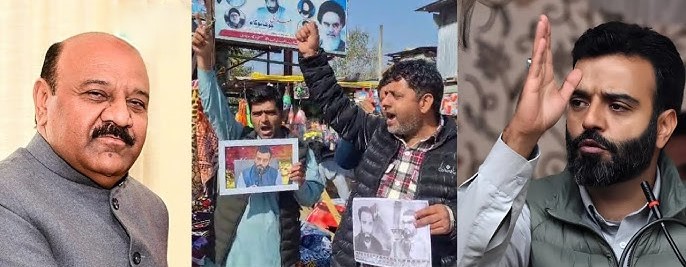A Political Storm Unfolds in Kashmir
By: Javid Amin | 21 October 2025
In a dramatic turn of events, Jammu and Kashmir’s Deputy Chief Minister Surinder Kumar Choudhary found himself at the center of a political storm after making remarks perceived as critical of National Conference MP Aga Syed Ruhullah Mehdi.
What began as an offhand statement during a public interaction quickly snowballed into street protests, effigy burnings, and calls for an apology, revealing widening cracks within the ruling party’s leadership.
By evening, the Deputy CM had retracted his statement, calling it a “misunderstanding.” Yet, the damage was done — the episode had exposed the growing friction inside the NC, particularly between the old guard and reformist voices represented by Ruhullah.
The Spark That Ignited the Unrest
The controversy began when Choudhary, during a press interaction in Jammu, made a remark that was widely interpreted as a veiled attack on Ruhullah Mehdi’s political conduct.
Without naming him directly, Choudhary reportedly questioned “leaders who criticize their own government for publicity,” a comment that many within the party — and nearly all outside it — took as a reference to Ruhullah.
Within hours, supporters of Aga Ruhullah Mehdi in Budgam and Bandipora took to the streets.
Protesters burned effigies of the Deputy CM, raised slogans in support of Ruhullah, and accused Choudhary of “disrespecting a leader who speaks truth to power.”
By late evening, social media was flooded with hashtags like #StandWithRuhullah and #NCUnityAtStake, reflecting how rapidly internal discontent had spilled into the public domain.
Deputy CM’s Clarification: “My Words Were Misinterpreted”
Under pressure from the escalating protests and negative media coverage, Surinder Kumar Choudhary issued a formal clarification.
In his statement, he insisted that his remarks had been “twisted out of context”, and that he was referring to a BJP candidate, not Ruhullah Mehdi.
“There has been a misunderstanding. My remarks were directed at a BJP leader who has been making unfounded statements against our government, not against Ruhullah Sahib, who I respect as a colleague and parliamentarian,”
Choudhary said in a televised statement.
He further added that he had “immense respect for Aga Ruhullah Mehdi’s contribution” and that any perception of intra-party animosity was “unfortunate and untrue.”
Despite the retraction, the incident highlighted the uneasy relationship between the Deputy CM and sections of the NC cadre — especially those loyal to Ruhullah, whose independent voice has often unsettled the party hierarchy.
Ruhullah’s Growing Distance from the Party Core
Aga Syed Ruhullah Mehdi, Member of Parliament and one of the NC’s most articulate figures, has increasingly emerged as the conscience keeper of the party — unafraid to question its decisions publicly.
Over the past year, Ruhullah has criticized the NC leadership over issues such as:
-
Reservation matrix revisions, which he described as “a political dilution of Kashmiri representation.”
-
Continued detentions under the Public Safety Act (PSA), even under an NC-led administration.
-
Slow movement on manifesto promises, especially those related to employment and civil liberties.
These stances have earned him a loyal base, particularly among educated youth and civil society voices, but have also isolated him within the NC’s inner circle.
One party insider, speaking anonymously, described the atmosphere as “tense but inevitable.”
“Ruhullah speaks what many in the NC feel privately but can’t say publicly. The leadership wants discipline; he wants honesty. That’s the clash.”
Factionalism Within the National Conference
The National Conference (NC) — historically the most dominant political force in Jammu and Kashmir — now faces one of its deepest internal rifts since returning to power in 2024.
The divide runs along generational and ideological lines:
-
On one side stands Chief Minister Omar Abdullah and the loyalist establishment.
-
On the other stands Ruhullah Mehdi and a growing faction of younger legislators demanding transparency and policy-driven governance.
The friction has been visible in recent weeks:
-
Ruhullah’s absence from the Budgam bypoll campaign for NC’s official candidate, Aga Syed Mehmood, was seen as a silent protest.
-
His social media remarks questioning the reservation policy and statehood timeline contradicted official NC positions.
Choudhary’s controversial remarks — whether intentional or not — have now crystallized these tensions into open conflict, forcing the leadership to confront the party’s internal dissent head-on.
Protests Spread Beyond Budgam
What initially began as a localized outcry in Budgam soon spread to Bandipora, Srinagar, and even parts of Kargil, where Ruhullah enjoys cross-sectarian respect as a moderate Shia voice.
Protesters carried placards reading “Respect Our Leader” and “NC Should Hear Its Own.”
Student groups, youth wings, and even local clerics condemned what they called “disrespect towards a people’s representative.”
According to police sources, demonstrations remained mostly peaceful, though minor clashes were reported near Beerwah.
By evening, law enforcement agencies increased presence near NC offices in Srinagar and Budgam, fearing the protests could be politically exploited by opposition parties, particularly the PDP and AAP.
Opposition Weighs In
Sensing opportunity, rival political camps were quick to comment.
PDP leader Waheed Parra called the episode “a glimpse into NC’s moral crisis,” while AAP’s Deeba Khan tweeted that “those who promise transparency cannot silence their own.”
Even BJP spokesperson Altaf Thakur weighed in, urging Ruhullah to “join hands with nationalists instead of being humiliated by his own party.”
These external reactions intensified pressure on the NC to demonstrate unity and discipline.
However, the controversy also thrust Ruhullah back into the national spotlight, with commentators framing him as the conscience of Kashmir’s mainstream politics — a leader willing to risk his position for principle.
A Timeline of the Crisis
-
October 17, 2025: Deputy CM Choudhary makes controversial remarks during a public event in Jammu.
-
October 18: Footage circulates online; NC youth leaders in Budgam react sharply.
-
October 19: Protests erupt in Budgam and Bandipora; effigies of Choudhary are burned.
-
October 19 (Evening): Choudhary issues clarification, blaming “misinterpretation.”
-
October 20: Ruhullah remains silent publicly, fueling speculation of deeper unrest.
-
October 21: NC core committee meets in Srinagar to address “party discipline and internal communication.”
Grassroots Voices: “He Speaks for Us”
In Budgam’s main market, where protests first erupted, the sentiment was unmistakable.
“When others remain silent, Aga Ruhullah speaks up,” said Nissar Ahmad, a college lecturer.
“He doesn’t hide behind power. That’s why people respect him, even if his own party doesn’t.”
Among younger Kashmiris, Ruhullah’s defiance has become a symbol of authentic politics — one that contrasts with the transactional nature of alliance-based governance.
Social media platforms have been flooded with support, with many calling Ruhullah “the people’s MP, not the party’s.”
The Larger Picture: NC’s Balancing Act
The National Conference now finds itself walking a tightrope — balancing governance responsibilities, coalition politics, and internal ideological diversity.
The party’s return to power after six years of central rule was expected to restore democratic confidence. Yet, dissent from within threatens to undermine that narrative.
Analysts suggest that Omar Abdullah’s leadership style — pragmatic but centralized — often leaves little space for outspoken voices like Ruhullah’s.
Yet silencing him could alienate an important demographic, especially educated urban voters who see Ruhullah as the moral anchor of the party.
Dr. Hilal Ahmad, a political scientist at the CSDS, observed:
“The challenge for NC is not just managing Ruhullah’s rebellion, but redefining what internal democracy means in a post-Article 370 political order.”
Beyond the Controversy: A Test of Democratic Maturity
The Ruhullah-Choudhary episode is more than an internal feud — it’s a litmus test for the National Conference’s political maturity in a region still rebuilding its democratic institutions.
If handled with dialogue and introspection, it could revive faith in intra-party accountability.
If suppressed, it risks repeating the mistakes of the past — where dissent was mistaken for disloyalty.
As one senior NC leader privately admitted:
“This is not about one remark. It’s about the direction of the party. Are we willing to listen to our conscience?”
What Lies Ahead
The NC’s core committee is reportedly working on damage control measures, including:
-
A formal reconciliation meeting between Ruhullah and Choudhary.
-
Guidelines for public communication by ministers.
-
A renewed emphasis on collective decision-making within the cabinet and party.
Meanwhile, Ruhullah’s silence continues to speak volumes.
His next move — whether a statement, a resignation threat, or a quiet return to parliamentary focus — will shape the NC’s internal balance and possibly the broader political discourse in Kashmir.
Bottom-Line: A Moment of Reckoning
The Ruhullah-Choudhary controversy has peeled back the surface of Jammu and Kashmir’s ruling establishment, revealing both the fragility and resilience of regional politics.
It underscores how personal dignity, party loyalty, and public accountability intersect in a space where political legitimacy is still being renegotiated.
For now, the effigies have stopped burning, but the embers of discontent remain.
And in those embers lies the question that may define the next chapter of Kashmiri politics:
“Can truth-telling survive in power politics — or will it always be misunderstood?”



